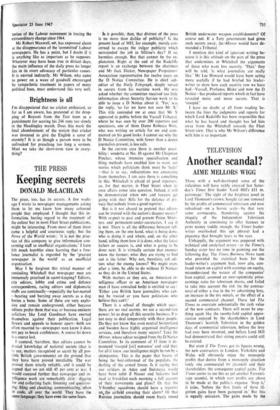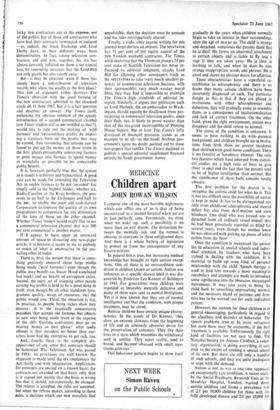Another scandal?
TELEVISION AIME MELLORS WIGG
Those with a well-developed sense of the ridiculous will have richly enjoyed last Satur- day's Times first leader 'Lord Hill's f11 tn. patronage.' The sight of the brightest jewel in Lord Thomson's crown, bought (at one remove) by the profits of commercial television and now subsidised—on a heroic scale—by that very same cornucopia, thundering against the iniquity of the Independent Television Authority in continuing to offer licences to print money (oddly enough, the Times leader- writer overlooked this apt phrase) had a piquancy that brought tears to the eyes.
Unhappily, the argument was peppered with technical and analytical errors—as the Times's Sunday sister lost no time in pointing out the following day. The Times Business News team who provided the statistical basis for the leader-writer's argument had, inter alla, con- fused return on capital with earnings on equity, misunderstood the nature of the companies' loan capital, assumed an over-optimistic price- earnings ratio for television shares, and failed to take into account the risk (to the contrac- tors) of either a rise in the TV advertising levy, an increase in the rrs rentals, or the effect of a second commercial channel. These led The Times to overstate substantially the cash value of the new contracts. There will never be any- thing again like the twenty-fold capital appre- ciation enjoyed by the shareholders in Lord Thomson's Scottish Television in the golden days of commercial television, before the levy had ever been invented, and before Lord Hill had demonstrated that sitting tenants could still be evicted.
But even if The Times got its figures wrong, the new contractors in London, Yorkshire and Wales will obviously enjoy the monopoly profits that derive from a monopoly situation (only one commercial TV channel) and their shareholders the consequent capital gains. The Times seems to see this as yet another Ferranti- type scandal, in which vast profits are about to be made at the public's expense. 'Stop it,' it cries, 'before the first fruits of these ill- gotten gains have been garnered in.' But this is equally mistaken. The gains made by the lucky new contractors are at the expense, not of the public, but of those old contractors who have had their contracts terminated or reduced —as, indeed, the Stock Exchange and Lord Derby have, in their different ways, been demonstrating. In fact, taking television con- tractors, old and new, together, the ITA has almost certainly inflicted on them a net capital loss, by reminding investors that the Lord Hill not only giveth but also taketh away.
But—it may be objected—even if there has simply been a redistribution of television wealth, why allow the wealth in the first place? This line of argument rather destroys The Times's obsession with the good fortune of the new contractors admitted to the charmed circle on 11 June 1967, but it is a fair question and deserves an answer. The Times itself, eschewing the obvious solution of the speedy introduction of a second commercial channel (are Times readers still as sec-minded as that?), would like to rule out the making of 'wild fortunes' and 'extraordinary profits' by impos- ing a statutory limit on the profits that may be earned, thus (assuming that anyone can be found to put up the money on those terms in the first place) presumably converting licences to print money into licences to spend money as wastefully as possible to no conceivable public benefit.
It is, however, perfectly true that the system as it stands is arbitrary and hypocritical. A good case can be made for amending the Television Act to enable licences to be not 'awarded' but simply sold to the highest bidder, whether ici, Radio Caroline or the Kray brothers; the pro- ceeds to go half to the Exchequer and half to the sec, to enable the poor old cash-starved Corporation to improve the quality of its own programmes to compensate for any diminution of the tone of those on the other channel. Whether Times readers would really like to see a commercial television channel that was 100 per cent commercial is another matter.
If I appear to have spent an untoward amount of space in dissecting one newspaper article, it is because it seems to me to embody so much of what is unattractive in the pre- vailing ethos of today.
There is, first, the notion that there is some- thing positively immoral about large profits being made ('wild fortunes') even though the public may benefit (as Stuart Hood concluded last week) and no breath of corruption exists. Second, the mere act of stopping other people earning big profits is held to be a good thing in itself, even though by all other standards (pro- gramme quality, waste of resources, etc) the public would lose. Third, the objection is not, in practice, to people being richer than they deserve: it is the _essentially conservative prejudice that accepts old fortunes but objects to new ones being made (even at the expense of the old). Existing contractors may go on making money as they please: what really offends is that outsiders no better than our- selves have had the enterprise to get rich, too.
And, 'fourth, there is the complete dis- appearance of any sense that contracts should be honoured. The Television Act was passed in 1954: its provisions are well known. No objection is made until the IPA implements the Act, fairly and with imagination. Applications for contracts are invited on a known basis; the contracts are awarded on that basis; only then is it argued not merely that the basis is wrong but that it should, retrospectively, be changed. The referee is accepted, the rules are accepted; but when the referee makes, according to those rules, a decision which our new moralists find unpalatable, then the decision must be unmade and the rules retrospectively altered.
Finally, a coda, since anyone writing for this journal must declare an interest. The SPECTATOR has 14- per cent of the equity capital of the new London weekend contractor. The Times, while declaring that the Thomson group's 55 per cent stake in Scottish Television has never in- fluenced its editorial judgment, attacks Lord Hill for allowing other newspapers (such as the SPECTATOR) to take (very much smaller) in- terests in commercial television because, with their (presumably) very much weaker moral fibre, they may find it impossible to maintain The Thnes's high standards of editorial in- tegrity. Similarly, it argues that politicians such as Lord Harlech, the ex-ambassador to Wash- ington, should equally be disallowed from par- ticipating in commercial television profits, since their flesh, too, is likely to prove weaker than that of the sea-green incorruptible of Printing House Square. But at least The Times's lofty disregard of financial pressures stands as an example to us all—as the Saudi Arabian gov- ernment's agent no doubt pointed out to those newspapers that (unlike The Times) declined to publish a special editorial supplement financed entirely by Saudi government money.































 Previous page
Previous page